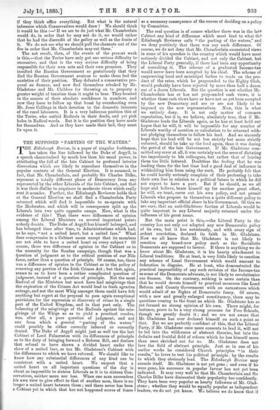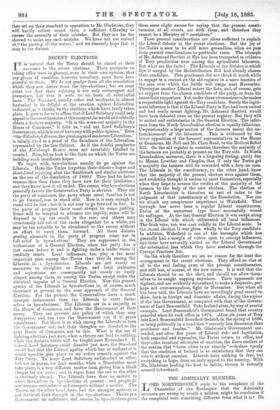THE SUPPOSED "PARTING OF THE WATERS."
THE Edinburgh Review, in a paper of singular feebleness, has taken the line followed by the Duke of Argyll, in a speech characterised by much less than his usual power, in attributing the fall of the late Cabinet to profound interior dissensions which are likely to reproduce themselves in the popular contests of the General Election. It is assumed, in fact, that Mr. Chamberlain, and probably Sir Charles Dilke, represent a totally different phase of Democracy from any represented by the other Liberals of the late Cabinet, and that it was their dislike to acquiesce in moderate views which really rent it asunder. Further, the Edinburgh Reviewer holds that at the General Election we shall find a Chamberlain Party returned which will find it impossible to co-operate with the Moderates, and which will in consequence split up the Liberals into two quite opposite camps. Now, what is the evidence of this ? That there were differences of opinion among the Liberal Ministers on several important points nobody doubts. The Duke of Argyll has himself belonged, and has belonged time after time, to Administrations which had, as he says, "not a united heart, but a united face." What does compromise in a Cabinet mean except that its members are not able to have a united heart on every subject ? Of course, there was difference of opinion in the Cabinet as to the necessity for the Soudan campaign, though that was a guestion of judgment as to the critical position of our Nile force, rather than a question of principle. Of course, too, there was a difference of opinion in the Cabinet as to the policy of renewing any portion of the Irish Crimes Act ; but that, again, seems to us to have been a rather complicated question of judgment, instead of a question of principle. Not the most Radical of the Ministers but must have had misgivings that the expiration of the Crimes Act would lead to fresh agrarian outrage, and not the most Whig amongst them could have felt anything but regret at the proposal to pass again exceptional provisions for the repression or discovery of crime in a single part of the United Kingdom, and in that part only. The balancing of the misgivings of the Radicals against the mis- givings of the Whigs so as to yield a practical resolve, was, after all, a pure question of judgment, and not one from which a general "parting of the waters" could possibly be either correctly inferred or correctly denied. The Duke of Argyll might just as well tax the last Cabinet of Lord Palmerston with its differences of principle as to the duty of bringing forward a Reform Bill, and declare that refusal to have shown a divided heart under the show of a united face, as tax Mr. Gladstone's Cabinet with the differences to which we have referred. We should like to know how any substantial differences of any kind can be consistent with a united heart. We suspect that a united heart on all important questions of the day is about as impossible to sixteen Liberals as it is to sixteen Con- servatives, neither more nor less. When one man surrenders his own view to give effect to that of another man, there is no longer a united heart between them ; and there never has been a Cabinet yet in which that has not happened scores of times
as a necessary consequence of the course of deciding on a policy by Committee.
The real question is of course whether there was in the late Cabinet any kind of difference which must lead to what the Edinburgh Reviewer calls "the parting of the waters," and we deny positively that there was any such difference. Of course, we do not deny that Mr. Chamberlain enunciated views in some of his speeches in the country which would have most seriously divided the Cabinet, and not only the Cabinet, but the Liberal Party generally, if there had been any opportunity of consulting it. The scheme of a graduated Income-tax would never have been accepted by his chief. The scheme of empowering local and municipal bodies to trade on the pro- duct of the rates, which he propounded to the Eighty Club, would probably have been rejected by more than half a dozen out of a dozen Liberals. But the question is not whether Mr. Chamberlain has or has not propounded rash views, it is whether those rash views have or have not as yet been accepted by the new Democracy and are or are not likely to be imposed on the new representatives. Now, this is what we entirely deny. It is not only matter of common expectation, but it is, we believe, absolutely true, that if Mr. Gladstone leads the Liberals again, as he has at least held out hopes that he will, it will be impossible for any number of Liberals worthy of mention or calculation to be returned with- out pledging themselves to follow his lead. And we sincerely hope that his lead will be not less strictly but more strictly enforced, should he take up the lead again, than it was during the period of the late Government. If Mr. Gladstone com- mitted any error at all, it was certainly not the error of dictating too imperiously to his colleagues, but rather that of leaving them too little fettered. Doubtless the feeling that he was leading them for the last time had a good deal of influence in withholding him from using the curb. He probably felt that he could hardly seriously complain of their preferring to take their own line in relation to a political future in which he did. not expect to have a part. But if he should, as we all hope and believe, brace himself up for another great effort, he will, we trust, carve out his own policy, and not permit Liberals who propose to themselves a quite different policy to take any important official share in his Government. Of this we are sure, that an anti-Gladstone faction of Liberals would be i quite impotent n any Liberal majority returned under the influence of his great name.
But the main point is this,—the Liberal Party in the country has not only not adopted any new Democratic policy of its own, but it has notoriously, and with every sign of ardent conviction, declared its faith in Mr. Gladstone. Now we all know that Mr. Gladstone is not likely to sanction any brand-new policy such as the Socialistic Democrats are supposed to favour. If there is anything we do know about Mr. Gladstone, it is his hearty attachment to Liberal traditions. He at least, is very little likely to sanction any scheme of Local Government which would amount to federation in disguise. He at least, who demonstrated the practical impossibility of any such revision of the Income-tax as some of the Democrats advocate, is not likely to revolutionize our finance. On the contrary, nothing is more certain than that he would devote himself to practical measures like Land Reform and County Government with an earnestness which would admit of no flights of Democratic fancy. Of course, with a new and greatly enlarged constituency, there may be questions coming to the front on which Mr. Gladstone has as yet formed no strong opinion of his own. There might, for instance, prove to be a very strong pressure for Free Schools, though we greatly doubt it ; and we are not aware that Mr. Gladstone has ever declared himself on such a point as that. But we are perfectly confident of this, that the Liberal Party, if Mr. Gladstone once more consents to lead it, will not be led into the wilderness of abstract theories, but into the definite and fruitful field of reform which he has himself more than once sketched out for us. Mr. Gladstone does not love the field of abstract principle. Just as in one of his earlier works he considered Church principles "in their results," he loves to test his political principle, by the results to which they obviously lead. The Edinburgh Review may console itself. Mr. Gladstone is not yet gone ; and even if he were gone, his successor in popular favour has not yet been indicated. It may very well be that Mr. Chamberlain and Sir Charles Dilke have discounted their popularity too confidently. They have been very popular as hearty followers of Mr. Glad- stone ; whether they would be equally popular as independent leaders, we do not yet know. We believe we do know that if they set up their standard in opposition to Mr. Gladstone, they will hardly collect round them a sufficient following to excuse the enormity of their mistake. But they are far too shrewd to make any such mistake. We have not yet arrived at "the parting of the waters," and we sincerely hope that it may be far distant.



































 Previous page
Previous page